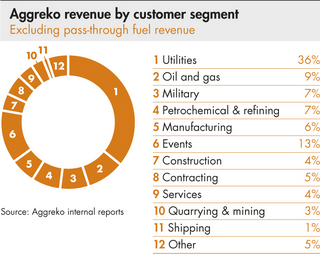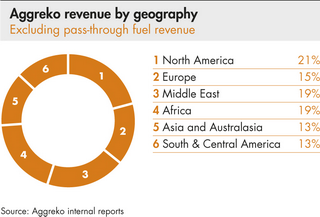Our Business Models
Aggreko is organised around two different business models:
Local business
Our Local business runs with high volumes of generally quite low value transactions, renting equipment to enable customers to respond quickly to requirements for power and temperature control. Aside from major events (where contracts can be worth tens of millions of pounds), the average contract size is around £10,000, but the range is from £200 to over £1,000,000. Although most of this business has a lead-time of 24 hours or more, about 25% of its revenues come from responding to emergencies. It is therefore essential to have the capability to deploy equipment and people to the customer's site within a matter of hours. This business operates from 148 service centres in North, Central & South America, Europe, the Middle East, Africa, Asia and Australasia. These service centres serve customers who are normally within a radius of 200 miles, and they offer the complete range of our products and services.
In 2010, the Local business had revenues of £696 million which is 60% of Aggreko's total revenue excluding pass-through fuel1.
International Power Projects
The International Power Projects business sells power which we deliver using power plants built, owned and operated by ourselves. Whereas in the Local business a contract with a customer is described in terms of renting specified items of equipment for a period of time, most of the contracts that International Power Projects performs are for providing a defined amount of electrical power, for which a customer pays a fixed monthly capacity charge; they then pay, in addition, a variable charge for each MW-hour they take. Under the terms of these contracts, Aggreko is responsible for installing and operating the equipment and the invoice to the customer is for power generation capacity not equipment rented. Most projects in this business are worth over £1 million a year and some can be worth very much more than that; in 2010, we invoiced our largest utility customer (excluding pass-through fuel) around £70 million. 75% of revenue comes from power utilities in developing countries but we also serve governments, armed forces, international agencies as well as oil and mining companies. A typical contract in this business would be for the rental of 20-50MW for an initial period of 6-9 months, which will often be extended. Our power-plants are highly modular, and their capacity can be flexed in 1MW increments using standard containerised units of our own proprietary design, assembled in our factory in Scotland; importantly, these generators are also in widespread use in the Local business, so fleet can be shared between the two businesses. They use either diesel or gas as fuel and are designed to be easily transportable, reliable and robust. Power projects can arise anywhere in the world and the required response time is generally weeks rather than the hours or days needed in the Local business. To support these projects, we concentrate our fleet in a number of hubs – in Central America, Europe, the Middle East and Asia. From each hub, large amounts of equipment can be shipped or flown rapidly to wherever it is needed.
In 2010, our International Power Projects business generated revenues of £460 million, or 40% of Aggreko's total revenue excluding pass-through fuel revenue1.
1 Pass-through fuel revenue relates to contracts in our International Power Projects business in Uganda where we provide fuel on a pass-through basis.
Who are our customers?
Aggreko serves every industry that uses power and temperature control, making our customer-base very diverse both in terms of geography and market segment. This is a great advantage, as it gives us some protection against problems in any one particular market. And we can quickly move resources to sectors and countries which are growing.


Competitive environment
When customers need power or temperature control equipment, they have the choice to buy, lease or rent, and therefore the biggest competitors for our customers' money are not rental companies, but equipment manufacturers. The vast majority of chillers and generators supplied to end-users each year are bought or leased, and only a few are rented. So, in terms of pricing and service, we always have to be focused on the fact that customers have a choice, not only of using other rental companies, but also to buy from manufacturers. The defining issues in the choice between buying and renting tend to be speed – how quickly do you need it? – and duration – how long do you need it for? Urgent need, and/or short duration, is the requirement that we as a rental business serve.
Within the Local business, barriers to entry are relatively low; many companies, small and large, drift in and out of rental, and competition in each market is fierce. Typically, competitors in the Local business are either privately-owned specialist rental businesses, or divisions of large plant-hire companies. Their common characteristic is that they are local: most of them operate in a single country and, often, in just a particular part of a country. In their own territory they are very effective, but they find it difficult to operate outside their home market. So in most areas in which we operate, competition in the Local business is fierce; but the names we do battle with will tend to be different country by country.
In International Power Projects we also see localised competition, often from the local distributors of major manufacturers such as Caterpillar, or from local entrepreneurs who want to try their hand at power generation. These companies find it hard to organise themselves across territories, however, and it is difficult to operate efficiently in the International Power Projects business without a large homogenous fleet and the infrastructure to market, sell and operate it in a consistent manner around the world.
In both the Local business and International Power Projects valuable economies of scale accrue to those who can operate on a global basis. However, to gain these benefits of global scale requires a very long-term commitment to building distribution, deep technical expertise across a number of disciplines, and a well developed supply-chain; it also requires hundreds of millions of pounds of capital to fund fleet investment. Some people have the misconception that Aggreko has grown from nothing over a short period of time; to the contrary, Aggreko was founded 50 years ago, and it has taken us decades, several billion pounds of cumulative investment in fleet and a global network of service centres to get to the point where we are big enough to enjoy the benefits of global scale. Over the last 10 years, some very large and powerful companies who have global scale in adjacent markets have tried to emulate Aggreko but none have yet succeeded in building a global integrated power and temperature control business of the same scale. Aggreko is, at the moment, the only business in the market which has grown large enough to capture the economies of global scale and, in turn, these efficiencies have enabled us to fund rates of investment far ahead of any competitor. As a consequence of this rate of investment, we have grown to be significantly larger than any other company operating in our market.